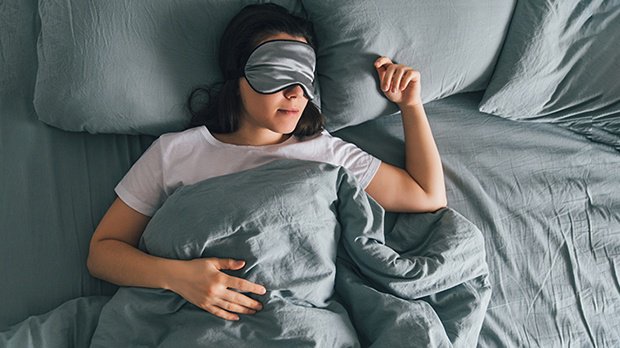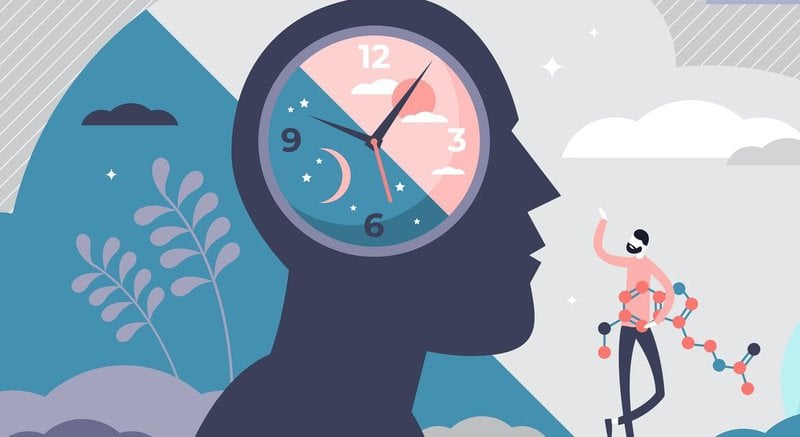Is 5 hours of sleep enough? How much sleep should I get?
This is an automatically translated article.
Research shows that not getting enough sleep can affect your ability to communicate, solve problems, and recall information. So you need to get enough sleep or else your body, health and overall quality of life could suffer. Read more to better understand if 5 hours of sleep is enough and how long should be.
1. Why is lack of sleep bad for your health?
Some people sleeping only 5 or 6 hours is not a good idea. There are many negative effects of sleep deprivation, such as feeling irritable and unable to function at your best. But many people may not know that sleep deprivation can also have profound consequences for our physical health?
According to statistics, one in three of us regularly suffers from insomnia and stress. Computers, electronic devices and busy work are the reasons given to explain this situation. However, the price to pay of all those sleepless nights is not only a bad mood but also a lack of concentration. Regular poor sleep puts us at risk for serious diseases, including overweight, obesity, metabolic cardiovascular disease and type 2 diabetes – the leading causes of our shortened life expectancy. It is now clear that a good night's sleep is essential to a long and healthy life.
Most of us need about 8 hours of sleep a night for our bodies to function properly - but many people can sleep less or more than this number. It's important to figure out how much sleep you need and then work to hit that time. As a general rule, if we wake up tired and spend the day hoping for a chance to take a nap, we're likely not getting enough sleep.
Many factors can cause poor sleep, including health conditions like sleep apnea. But in most cases it is usually due to bad sleep habits.
Sometimes a sleepless night will leave you feeling tired and cranky the next day, but it won't harm your health. However, after many sleepless nights, the effects on our mental health will become more and more severe. The brain will work inefficiently, making it difficult for us to focus and make decisions. Many people will begin to feel sad and may oversleep during the day. Our risk of injury and accidents at home, work and on the road also increases.
If this continues, lack of sleep can affect our overall health and make you more susceptible to serious conditions, such as obesity, heart disease, high blood pressure and diabetes. Here are 7 reasons why we should not fall asleep:
Sleep strengthens immunity: Lack of sleep can be the cause of many health problems such as colds and flu. . Prolonged lack of sleep can disrupt the immune system, so the body is less able to fight off foreign invaders. Sleep Can Stabilize Weight: Less Sleep Can Mean Weight Gain! Studies have shown that people who sleep less than 7 hours a day tend to gain more weight and have a higher risk of obesity than those who sleep 7 hours. This is thought to be because sleep-deprived people have reduced levels of leptin (the chemical that makes them feel full) and increased levels of ghrelin (the hormone that stimulates hunger). Sleep boosts mental health: A single sleepless night can leave us irritable and moody the next day, so it's not surprising that chronic sleep deprivation can lead to long-term mood disorders such as depression and anxiety. When people with anxiety disorders or depression were surveyed to calculate their sleep habits, it was found that most of them slept less than six hours a night.
According to statistics, one in three of us regularly suffers from insomnia and stress. Computers, electronic devices and busy work are the reasons given to explain this situation. However, the price to pay of all those sleepless nights is not only a bad mood but also a lack of concentration. Regular poor sleep puts us at risk for serious diseases, including overweight, obesity, metabolic cardiovascular disease and type 2 diabetes – the leading causes of our shortened life expectancy. It is now clear that a good night's sleep is essential to a long and healthy life.
Most of us need about 8 hours of sleep a night for our bodies to function properly - but many people can sleep less or more than this number. It's important to figure out how much sleep you need and then work to hit that time. As a general rule, if we wake up tired and spend the day hoping for a chance to take a nap, we're likely not getting enough sleep.
Many factors can cause poor sleep, including health conditions like sleep apnea. But in most cases it is usually due to bad sleep habits.
Sometimes a sleepless night will leave you feeling tired and cranky the next day, but it won't harm your health. However, after many sleepless nights, the effects on our mental health will become more and more severe. The brain will work inefficiently, making it difficult for us to focus and make decisions. Many people will begin to feel sad and may oversleep during the day. Our risk of injury and accidents at home, work and on the road also increases.
If this continues, lack of sleep can affect our overall health and make you more susceptible to serious conditions, such as obesity, heart disease, high blood pressure and diabetes. Here are 7 reasons why we should not fall asleep:
Sleep strengthens immunity: Lack of sleep can be the cause of many health problems such as colds and flu. . Prolonged lack of sleep can disrupt the immune system, so the body is less able to fight off foreign invaders. Sleep Can Stabilize Weight: Less Sleep Can Mean Weight Gain! Studies have shown that people who sleep less than 7 hours a day tend to gain more weight and have a higher risk of obesity than those who sleep 7 hours. This is thought to be because sleep-deprived people have reduced levels of leptin (the chemical that makes them feel full) and increased levels of ghrelin (the hormone that stimulates hunger). Sleep boosts mental health: A single sleepless night can leave us irritable and moody the next day, so it's not surprising that chronic sleep deprivation can lead to long-term mood disorders such as depression and anxiety. When people with anxiety disorders or depression were surveyed to calculate their sleep habits, it was found that most of them slept less than six hours a night.

Ngủ ít có thể dẫn đến một số vấn đề sức khỏe như cảm cúm, mệt mỏi,...
Sleep Prevents Diabetes: Studies have suggested that people who usually sleep less than 5 hours a night have a higher risk of diabetes. It appears that missing out on deep sleep could lead to type 2 diabetes by changing the way your body processes glucose, which your body uses for energy. Sleep Boosts Sex Drive: Men and women who don't get enough sleep have lower libidos and less interest in sex, a recent study found. Men with sleep apnea -- a disorder that makes it hard for them to breathe and disrupt sleep -- also tend to have lower testosterone levels and possibly a decreased sex drive. Sleep prevents heart disease: Prolonged sleep deprivation seems to be linked to increased heart rate, increased blood pressure and increased levels of certain chemicals linked to inflammation, which can put a lot of stress on it. to our hearts. Sleep Boosts Fertility: Difficulty conceiving is thought to be one of the effects of sleep deprivation in both men and women. Clearly, frequent sleep disruptions can make it difficult to conceive by reducing the secretion of reproductive hormones. If you're not getting enough sleep, there's only one way to make up for it - sleep more. It won't happen overnight. If you've had months of limited sleep, you'll incur huge sleep debt. Therefore, the recovery process will take a long time, even weeks. Starting on the weekend, try to get an extra hour or two of sleep each night. The way to do this is to go to bed when you feel tired and allow your body to wake you up in the morning.
Initially, you can sleep up to 10 hours per night. After a while, the amount of time you sleep will gradually decrease to a normal level. Don't rely on caffeine or energy drinks as a short-term option. They can boost your energy and focus temporarily, but can disrupt your functioning and cause circadian rhythms to be affected even more in the long term.
Initially, you can sleep up to 10 hours per night. After a while, the amount of time you sleep will gradually decrease to a normal level. Don't rely on caffeine or energy drinks as a short-term option. They can boost your energy and focus temporarily, but can disrupt your functioning and cause circadian rhythms to be affected even more in the long term.
2. Is 5 hours of sleep enough? How much sleep should I get?
2.1. Is 5 hours of sleep enough Sometimes the hustle and bustle of life makes us not get enough sleep. But just 5 hours of sleep in a day is not enough, especially in the long run. According to a 2018 study of more than 10,000 participants, the body's ability to function will decrease if you don't get enough sleep from seven to eight hours a night. Our speaking, reasoning and overall thinking skills are not working at full capacity, researchers have found. We need 7 to 8 hours of sleep every night to perform at our best:
Communication skills Planning skills Decision making skills
Communication skills Planning skills Decision making skills

Ngủ 5 tiếng mỗi ngày là không đủ để bạn có sức khỏe tốt
2.2. What is the recommended amount of sleep? Many of us don't get enough sleep. According to the Centers for Disease Control and Prevention (CDC), more than one-third of American adults don't get enough sleep on a regular basis. The National Sleep Foundation's sleep duration recommendations for healthy individuals without sleep disorders are as follows:
Infants: 14 to 17 hours Infants: 12 to 15 hours Toddlers: 11 until 2 p.m. Preschoolers: 10 to 13 p.m. School-aged children: 9 to 11 a.m. Teenagers: 8 to 10 p.m. Teenagers: 7 to 9 a.m. Adults: 7 to 9 a.m. Adults: 7 to 8 hours 2.3. What are the symptoms of sleep deprivation? Immediate symptoms of sleep deprivation include:
Excessive sleepiness Yawning frequently Lack of concentration Irritability Daytime fatigue Forgetfulness Restlessness, anxiety In particular, symptoms will become worse if You don't get enough sleep for a long time. You may even experience hallucinations.
There are a number of health risks associated with sleep deprivation, including:
Brain activity is similar to aging. A 2018 study looked at severe sleep deprivation (no more than four hours a night). The researchers found it leads to a decline in thinking ability equivalent to aging us by almost eight years. Risk of diabetes. A 2005 study found that getting too little sleep (six hours or less) was associated with an increased risk of diabetes. Too much sleep (nine hours or more) is also associated with an increased risk. Die early. A 2010 review and meta-analysis found that getting too little sleep at night increases the risk of early death. Risk of stroke or heart disease. A 2011 review based on the results of 15 studies found that people who sleep less than seven hours per night have a much higher risk of stroke or heart disease than those who get seven to eight hours of sleep per night.
Infants: 14 to 17 hours Infants: 12 to 15 hours Toddlers: 11 until 2 p.m. Preschoolers: 10 to 13 p.m. School-aged children: 9 to 11 a.m. Teenagers: 8 to 10 p.m. Teenagers: 7 to 9 a.m. Adults: 7 to 9 a.m. Adults: 7 to 8 hours 2.3. What are the symptoms of sleep deprivation? Immediate symptoms of sleep deprivation include:
Excessive sleepiness Yawning frequently Lack of concentration Irritability Daytime fatigue Forgetfulness Restlessness, anxiety In particular, symptoms will become worse if You don't get enough sleep for a long time. You may even experience hallucinations.
There are a number of health risks associated with sleep deprivation, including:
Brain activity is similar to aging. A 2018 study looked at severe sleep deprivation (no more than four hours a night). The researchers found it leads to a decline in thinking ability equivalent to aging us by almost eight years. Risk of diabetes. A 2005 study found that getting too little sleep (six hours or less) was associated with an increased risk of diabetes. Too much sleep (nine hours or more) is also associated with an increased risk. Die early. A 2010 review and meta-analysis found that getting too little sleep at night increases the risk of early death. Risk of stroke or heart disease. A 2011 review based on the results of 15 studies found that people who sleep less than seven hours per night have a much higher risk of stroke or heart disease than those who get seven to eight hours of sleep per night.

Thời gian ngủ đủ giấc ở mỗi độ tuổi sẽ khác nhau
According to the American Academy of Sleep Medicine, we often experience sleep deprivation due to:
An underlying health condition. Day-to-day sleep disturbances or other conditions may disturb sleep. Insufficient sleep syndrome (ISS) is caused by behavior. This is the medical term for delaying sleep in order to engage in another activity such as watching TV. Influence of work or work schedule. Long or irregular work hours can affect our sleep schedule. Some people may experience sleep disturbances while working in shifts. Personal obligations. For example, taking care of babies or taking care of elderly parents... Sleep is an important factor to ensure good health. Not getting enough sleep can lead to decreased brain performance and, in the long run, it can increase your risk of serious health problems including heart disease, stroke, and diabetes. .... Scientists evaluate that sleeping 5 hours a day is too little and should not be maintained for a long time if you do not want to suffer from the above diseases. Try to get 7 to 8 hours of sleep every night. And for a good night's sleep, practice good sleep hygiene.
An underlying health condition. Day-to-day sleep disturbances or other conditions may disturb sleep. Insufficient sleep syndrome (ISS) is caused by behavior. This is the medical term for delaying sleep in order to engage in another activity such as watching TV. Influence of work or work schedule. Long or irregular work hours can affect our sleep schedule. Some people may experience sleep disturbances while working in shifts. Personal obligations. For example, taking care of babies or taking care of elderly parents... Sleep is an important factor to ensure good health. Not getting enough sleep can lead to decreased brain performance and, in the long run, it can increase your risk of serious health problems including heart disease, stroke, and diabetes. .... Scientists evaluate that sleeping 5 hours a day is too little and should not be maintained for a long time if you do not want to suffer from the above diseases. Try to get 7 to 8 hours of sleep every night. And for a good night's sleep, practice good sleep hygiene.
Please dial HOTLINE for more information or register for an appointment HERE. Download MyVinmec app to make appointments faster and to manage your bookings easily.
Reference sources: nhs.uk, healthline.com, greatist.com
This article is written for readers from Sài Gòn, Hà Nội, Hồ Chí Minh, Phú Quốc, Nha Trang, Hạ Long, Hải Phòng, Đà Nẵng.




